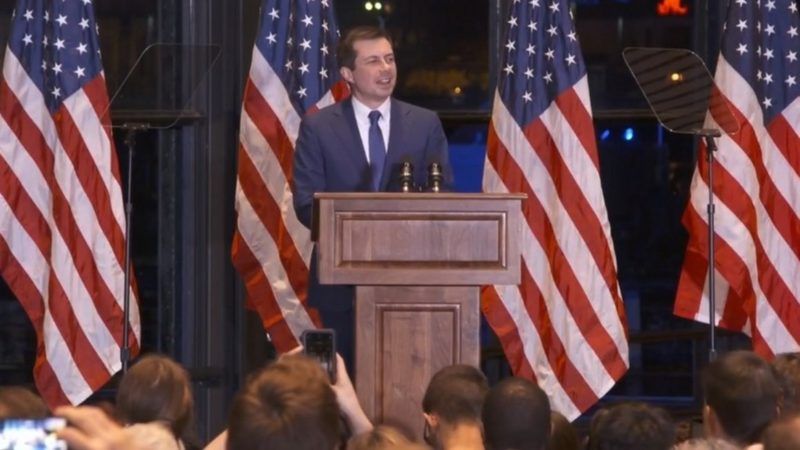Pete Buttigieg Drops Out of Presidential Race Following Poor South Carolina Showing
Promises to fight for Democratic nominee

Joe Biden's strong showing in South Carolina's primary has put an end to Pete Buttigieg's attempt to offer himself up as a more moderate alternative to the likes of Sens. Bernie Sanders (I–Vt.) and Elizabeth Warren (D–Mass.).
Tonight the former South Bend, Ind., mayor announced he was suspending his campaign, a day after he came in fourth in South Carolina's primary, getting fewer votes than Tom Steyer, who dropped out Saturday night.
"Our goal has always been help unify Americans to beat Donald Trump and to win the era for our values," Buttigieg said in his concession speech Sunday evening. But after acknowledging that his path to victory has narrowed following a poor performance in South Carolina, he announced his own campaign was over. He didn't throw his support behind a particular candidate, but said he would "do everything in my power to make sure we have a new Democratic president in the White House come January."
Buttigieg drew remarkable attention for a candidate who had held no previous federal office, was only 38 years old, and a fairly thin political resume. He barely edged out Sanders in Iowa to win the most delegates in that state, but did not fare as well in subsequent races.
Buttigieg is openly gay and married, and the mix of his sexuality and his unwillingness to rush as far to the left as candidates like Sanders and Warren caused friction with other vocal LGBT activists and writers. He inspired a number of think pieces about whether he was "gay enough," chin-stroking, self-absorbed essays that were barely about Buttigieg at all but really about the person writing it and the gap between the writer's experiences and Buttigieg's. The worst vitriol aimed at Buttigieg came not from religious conservatives but from those who were clearly upset that the first major openly gay candidate for president wasn't some fire-breathing radical looking to smash capitalism and arrest Wall Street. (Spencer Kornhaber at The Atlantic highlights some of the worst here.)
As for his actual positions, Buttigieg was a mixed bag for those who prioritize liberty. His most admirable position was his call for the decriminalization of all drug possession. He didn't go as far as calling for full legalization, but his platform was very clear that he opposed incarceration for drug use.
Buttigieg also used his experience as a military veteran, a Navy intelligence officer who served in Afghanistan, to call for the removal of our troops from Iraq and Afghanistan and the ending of our current wars. He called for future Congressional Authorizations for Use of Military Force to come with automatic three-year sunsets.
And he at least acknowledged that too much national debt was a bad thing (though he didn't really propose how to cut it and had his own plan for massive spending increases), his health care plan didn't call for forcing everybody to give up private insurance into a nationalized system, and his free college proposal had an income cap for participants. That marked him as a "moderate" in this election, which just shows how much that Overton Window has been shifted among the Democratic electorate.
On the "bad ideas" side, Buttigieg pandered to unions, calling for employees in the gig economy be allowed to unionize, even though such a plan would essentially gut the system, cause labor costs to skyrocket, and make it extremely hard for people to work as freelancers.
If his government spending plans and intervention plans seemed modest, it was only in comparison with the extremely expensive, intrusive proposals from the likes of Warren and Sanders. In reality, Buttigieg was very much a big government, big spending guy who seemed reasonable compared to those who insisted that the government could provide everything to everybody by taxing the rich and attacking Wall Street.
Buttigieg's worst proposal is one he shared with fellow failed candidate Rep. John Delaney (D–Md.), a year of national service by young Americans when they reach 18. He stopped short of saying he'd make it legally mandatory (unlike Delaney), but nevertheless said he believed that forcing young adults to work for the government for a year would foster "social cohesion," showing how little he understood many of his fellow Americans.
In the end, his campaign did remarkably well given his initial lack of name recognition or concrete history of success to point to. If nothing else, he shows that there is a good chunk of Democrats out there still who have some hard limits about how much of our economy and personal lives they think government should control. But the open gleeful viciousness in the way he's been attacked by people looking to drag the party further to the left toward more socialism is indicator of a party fracture that's going to last for a while.


Show Comments (139)